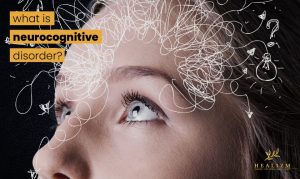
Neurocognitive disorder is an overall term that describes reduced mental function due to a medical illness other than a psychiatric disease.
Neurocognitive disorders are assembled into three subgroups:
- Delirium.
- Mild neurocognitive disorder.
- Major neurocognitive disorder.
Healizm guides and assists you during your difficult life circumstances.
Major and Mild Neurocognitive Disorder
Evidence of considerable cognitive deterioration from a prior level of competence in one or more of these cognitive areas.
The following symptoms classify the major neurocognitive disorder (dementia).
- A substantial memory loss.
- Disorientation.
- Language difficulties.
- Personality changes.
- A lack of reasoning ability.
- Impaired visual perception.
The following symptoms define mild neurocognitive disorder (mild cogntive imapirment).
- Memory loss.
- Language problems.
- Issues with attention.
- Reasoning and judgment.
- Visual perception.
For further support and information, contact us.
Causes of Neurocognitive Disorder
- Genetics – There can be some genes that might cause one to develop conditions like alzheimer’s disease and other neurocognitive disorders.
- Environments aspects – Pollutants, toxins and traumatic brain injuries can affect the brain health.
- Lifestyle – One’s diet, physical activity and substance abuse directly affect cognitive health.
- Chronic diseases – Heart disease, diabetes and blood pressure can also cause the symptoms of emerging neurocognitive issues.
- Age – The age of a person also matters greatly.
Useful Resources:
Treatment Options
Some neurocognitive abnormalities are short-lived. Some people recover completely after receiving the appropriate treatment.
Other sorts of neurocognitive impairments provide more challenges. They can be permanent or worsen over time.
Treatment can help persons with these disorders manage their symptoms or delay the disease’s course.
Treatment options vary depending on the disease. However, some of the more prevalent include:
- Medication.
- Physical, occupational, language, and cognitive therapy.
- Surgery.
- Family and caregiver support.
Risk Factors for Neurocognitive Disorders
Neurocognitive disorders like dementia, mainly affect:
- Memory.
- Thinking.
- Reasoning abilities.
Neurocognitive disorders are very different from mental illnesses — like schizophrenia or depression.
Then again, there’s a chance that people with mental health conditions might develop these cognitive disorders later in their life.
Also there can be some symptoms that might overlap which can make diagnosis hard.
To make an accurate diagnosis, healthcare providers use different methods of diagnostic tests to separate between symptoms of neurocognitive disorders and those of mental illnesses.
These exams frequently include:
-
Cranial CT scan
This procedure uses a series of X-rays. It takes pictures of the skull, brain, sinuses, and eye sockets.
It could be used to study soft tissues in the brain.
-
Head MRI scan
This imaging technique uses powerful magnets and radio waves to create detailed brain images. These images can reveal signs of brain injury.
-
Positron Emission Tomography (PET) scan.
A PET scan employs a specific dye that contains radioactive tracers. These tracers are injected into a vein and circulated throughout the body to highlight damaged areas.
-
Electroencephalography (EEG)
An EEG measures the electrical activity of the brain. This test can assist in identifying any issues with this activity.
Conclusion
Neurocognitive illnesses like dementia and Alzheimer’s can be difficult to manage.
If you or a loved one has been diagnosed with an essential neurocognitive disorder, there is help available.
FAQs
What are the main symptoms of neurocognitive disorder?
Patients may present with symptoms such as:
- Changes in behavior.
- Getting lost in familiar neighborhoods.
- Memory loss.
- Alterations in mood.
- Aggression.
- Social withdrawal.
What is the most common neurocognitive disorder?
Alzheimer’s disease is the most prevalent cause of neurocognitive impairments in those over the age of 65. In some instances, there could be a genetic component.
Is Alzheimer’s a neurocognitive disorder?
Alzheimer’s disease is the most frequent type of significant neurocognitive illness, yet it is only one of several potential causes.
What is a cognitive disorder?
Cognitive disorders are defined as any disorder that significantly impairs an individual’s cognitive abilities to the point where regular functioning in society becomes impossible without treatment.
